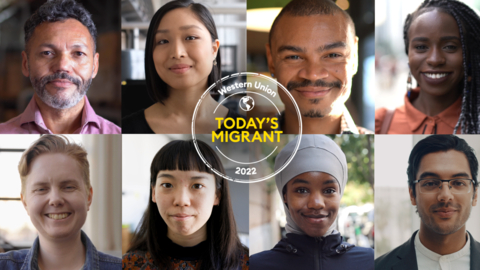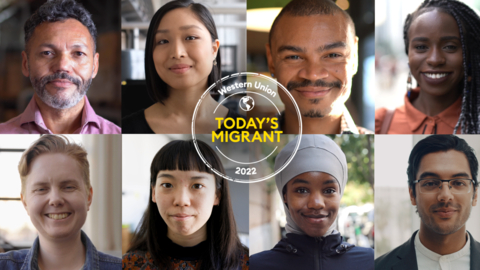DENVER--(BUSINESS WIRE)--Western Union (NYSE: WU) released new data today exploring the perspectives and motivations of migrants* in the United States, United Kingdom, Germany, France, Japan and the United Arab Emirates.
Today’s migrants represent a diverse range of socioeconomic backgrounds and contribute economically, culturally, and in many other ways to their adopted countries. Survey results reveal three key insights:
-
Migrants are engines of optimism. Today’s migrants in many parts of the world share that they feel valued and accepted, with positive attitudes towards their host countries. In the U.S., for example:
- 86% of migrants view the country in a positive way, versus 68% of the general population
- 88% of migrants feel appreciated and 95% say they can do well if they work hard
-
Migrants are tech-forward. Always on the lookout for a way to make their lives easier or better, today’s migrants are familiar with cryptocurrency and comfortable with digital financial services. In the U.S.:
- 57% of migrants are familiar with cryptocurrency
- 83% of migrants access financial services digitally or a mixture of both digital and in person
- Migrants are motivated by a pursuit for a better future. Most migrants say they moved to the U.S. for better job prospects, higher pay, or to pursue education and training.
“Throughout history, people have moved across borders in search of new opportunities. For some it is a choice, and for others a necessity. At Western Union, we consider it a privilege to support today’s migrants as they build the better future they envision for themselves, their families, and communities,” said Devin McGranahan, Western Union President and CEO. “The 280 million migrants globally represent a major economic force, so it is important to understand the perspectives, motivations and ambitions of these essential members of society.”
Western Union has also partnered with The Fletcher School at Tufts University to explore where economic opportunity, skills shortages, and a socio-political openness to migration are likely to intersect and create the next geographies of social stability, economic growth, and innovation.
“The need for labor had surpassed pre-pandemic levels in countries like Australia, Canada, the United States, and several others by the end of 2021,” said Bhaskar Chakravorti, dean of global business at The Fletcher School. “As countries around the world emerge from the pandemic-induced economic contraction, those that are more welcoming and accepting of migrants will be able to close their labor market gaps much more efficiently; they are able to tap into diverse, globally aware, and technology savvy labor pools, and generate dividends both for the home and host countries in the process.”
This collaboration between Western Union and The Fletcher School at Tufts University will include the development of the “Migration Quotient”—a scorecard measuring countries’ need for and acceptance of migrants coupled with the momentum of migration into and out of countries. In addition, the collaboration will also focus on bottom-up analyses of key remittance corridors and ethnographic studies on migrants and displaced communities.
More information from the ‘Today’s Migrant’ survey is available here.
WU-G
About Western Union
The Western Union Company (NYSE: WU) is a global leader in cross-border, cross-currency money movement and payments. Western Union’s platform provides seamless cross-border flows and its leading global financial network bridges more than 200 countries and territories and over 130 currencies. We connect consumers, businesses, financial institutions, and governments through one of the world’s widest reaching networks, accessing billions of bank accounts, millions of digital wallets and cards, and a substantial global network of retail locations. Western Union connects the world to bring boundless possibilities within reach. For more information, visit www.westernunion.com.
*Migrants for the purpose of this study are defined as a person who moves across an international border away from his or her place of usual residence, temporarily or permanently, and for a variety of reasons





